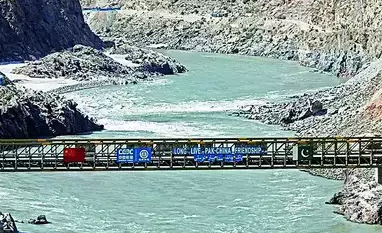India Seeks Modifications to Indus Waters Treaty with Pakistan
India has officially informed Pakistan about changes it wants to make to the Indus Waters Treaty (IWT), citing unexpected and significant reasons. This notice was given under Article XII(3) of the treaty, which allows changes to be made through a new agreement between the two countries. India had already sent a notice in January 2023 because of ongoing arguments about Indian hydropower projects.
What is the Indus Waters Treaty?
The Indus Waters Treaty was signed in 1960 to help India and Pakistan share water from the Indus River and its tributaries. Under this treaty, India can use the Eastern Rivers (Beas, Ravi, Sutlej), and Pakistan controls the Western Rivers (Indus, Chenab, Jhelum). The World Bank helped create this treaty to resolve water disputes after the partition of India. It also set up a Permanent Indus Commission to handle conflicts. Despite tensions, the treaty has survived wars and disputes, making it a rare success in managing water between two countries.
The Indus Waters Treaty was signed in 1960 to help India and Pakistan share water from the Indus River and its tributaries. Under this treaty, India can use the Eastern Rivers (Beas, Ravi, Sutlej), and Pakistan controls the Western Rivers (Indus, Chenab, Jhelum). The World Bank helped create this treaty to resolve water disputes after the partition of India. It also set up a Permanent Indus Commission to handle conflicts. Despite tensions, the treaty has survived wars and disputes, making it a rare success in managing water between two countries.
Dispute over Hydroelectric Projects
India’s recent notice comes after years of disagreements with Pakistan over two Indian hydropower projects on the Kishanganga and Chenab rivers. Pakistan has raised concerns multiple times, leading to attempts to resolve the issue through the treaty’s dispute-resolution process. However, no final solution has been reached.
India’s recent notice comes after years of disagreements with Pakistan over two Indian hydropower projects on the Kishanganga and Chenab rivers. Pakistan has raised concerns multiple times, leading to attempts to resolve the issue through the treaty’s dispute-resolution process. However, no final solution has been reached.
How Are Disputes Resolved Under the Treaty?
- The IWT outlines a three-step process for solving disputes under Article IX:Indus Commissioners from both countries try to resolve the issue.
- If they fail, a Neutral Expert is appointed to clarify.
- If the issue still isn’t resolved, it can be taken to a Court of Arbitration.
Does India Want to Renegotiate?
India’s notice shows that it is concerned about changes like population growth, environmental challenges, and cross-border terrorism. India believes that the original treaty, made in the 1960s, does not address modern issues like climate change. These concerns are pushing India to ask for a renegotiation of the treaty.
India’s notice shows that it is concerned about changes like population growth, environmental challenges, and cross-border terrorism. India believes that the original treaty, made in the 1960s, does not address modern issues like climate change. These concerns are pushing India to ask for a renegotiation of the treaty.
Key Events Since January 2023
- April 2023: India holds a meeting to review the process for changing the treaty.
- July 2023: The Court of Arbitration claims it has the power to deal with the Kishanganga and Ratle projects, but India disagrees.




Comments
Post a Comment